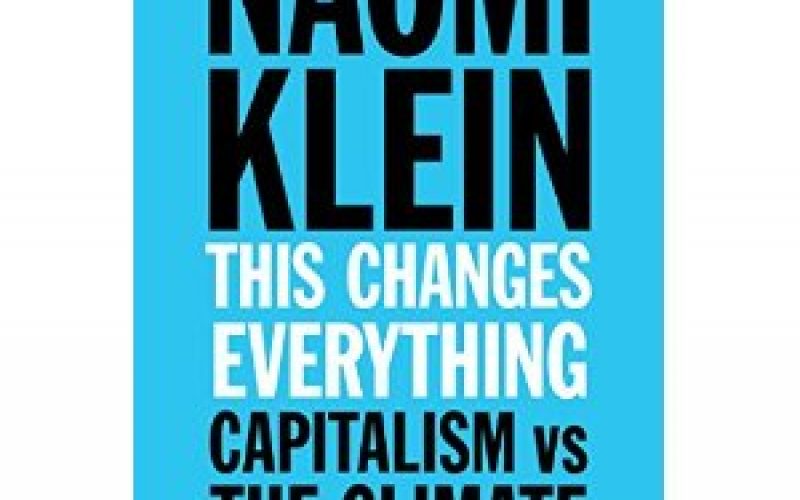In the bestselling book “This Changes Everything: Capitalism vs The Climate,” journalist Naomi Klein investigates power as the issue. Much attention is given to runaway emissions, and less on the fundamental economic and political system itself. Virtually all climate scientists agree that we are destroying our planet, with abundant evidence, but confusion remains on a solution. She clears this up: free market capitalist ideology must be confronted.
Before serious progress is made, climate change denial among everyone needs to be recognized. Klein explains that denial is not limited merely to anti-science politicians. It exists among the entire public in different forms. Many of us choose to “look away” using various unhelpful rationalizations.
We must courageously face the frightening truth of the climate crisis. This must be treated like the global emergency it is because massive investment is required, akin to war or bank bailouts. Undeniably, this must occur because it is the greatest threat humankind has ever faced, rivaled only by nuclear holocaust.
Worldwide, governmental leaders are failing us. During negotiations leading to weak nonbinding agreements from 1990-2013, climate emissions have increased 61 percent. The cold reality is our current leaders are not going to save us.
Klein concludes with systems researcher Dr. Brad Werner’s poignant question: “Is Earth Fucked?” Werner presented this topic at a 2012 meeting of the American Geophysical Union, a meeting of 24,000 earth and space scientists. He detailed much complex mathematical information to answer this question, but the take-home answer was “More or less” because of global capitalism’s unfettered resource consumption.
Thankfully, there was a variable for hope, which Werner labeled “resistance.” This is defined as movements of people engaging in “environmental direct action…protests, blockades and sabotage,” which cause “friction” with capitalism. According to Werner and Klein, only “mass social movements can save us now.”
In the book, Klein investigated various “friction” movements, past and present. Historically, many social movements have proven disruptive to the status quo. The climate challenge, on the other hand, requires a “radical economic transformation,” which can be more difficult because social changes are less costly.
In terms of powerful economic shifts, the best examples, besides colonial independence movements, are the labor movement after the Great Depression and slavery abolition. The labor movement and mass unionization resulted in a great wealth transfer from the capitalist class to the working class. This included many social programs, public infrastructure investment and regulation of Wall Street.
However, the slavery abolition movement is perhaps the best analogy. In his essay “The New Abolitionism,” journalist Chris Hayes wrote, “the climate justice movement is demanding that an existing set of political and economic interests be forced to say goodbye to trillions of dollars in wealth.” Hayes also adds that “in 1860, slaves represented about 16 percent of…all the wealth” in the United States, “which in today’s terms is a stunning $10 trillion.” This is approximately the value of fossil fuels that must remain in the ground to avoid a 2 degree Celsius global temperature increase. In both cases, the cost to elites is steep, but the new demands could end the reigning oligarchy.
Although many past movements, such as for civil rights, succeeded legally, few did so economically. This is why great injustice, poverty and discrimination still remain. Many of these movements for equal rights still exist in some form today, so climate justice does not necessarily need a new movement. She writes, “climate change can be the force—the grand push—that will bring together all these still living movements. A rushing river fed by countless streams, gathering force to finally reach the sea.” The lesson from past movements is that major power shifts required massive social mobilization, when “Activists were…everyone.”
Ultimately, Klein concludes it is not too late and we have plenty of solutions, but free market ideology must be challenged. This worldview change can lead to “rapid-fire lawmaking” like the New Deal. The idea that we are “hopelessly selfish” as taught by television programming and neoclassical economics must be abandoned. We must shift mindsets from pure individualistic competition and hierarchical domination to cooperation and interdependence. Additionally, like past movements, we must embrace the language of morality, love and indignation to “alter public opinion,” as abolitionist Wendell Phillips put it.
Many people and groups exist as infrastructure for a mass climate justice movement, but one thing has yet to manifest. As journalist Luis Navarro said, this thing is the right moment when pessimism is dissolved in the “effervescence of rebellion.” A precipitating spark must occur, such as a certain crisis, economic, political or natural, which are abundant. When that surprising event unfolds, Klein suggests activists powerfully seize the moment to “denounce the world as it is…and build the world that will keep us safe.”
Related Announcement: The monthly OMNI Climate Change Book Forum will be discussing this book at 1:30 p.m. March 1 in the Fayetteville Public Library. OMNI 350 organizer Shelley Buonaiuto and climatologist Dr. Robert McAfee will chair the event.
Book Discussion for “This Changes Everything: Capitalism vs The Climate”
When: Sunday 1:30 p.m., March 1.
Where: Fayetteville Public Library
Who: OMNI 350 organizer Shelley Buonaiuto and climatologist Dr. Robert McAfee will chair the event.




